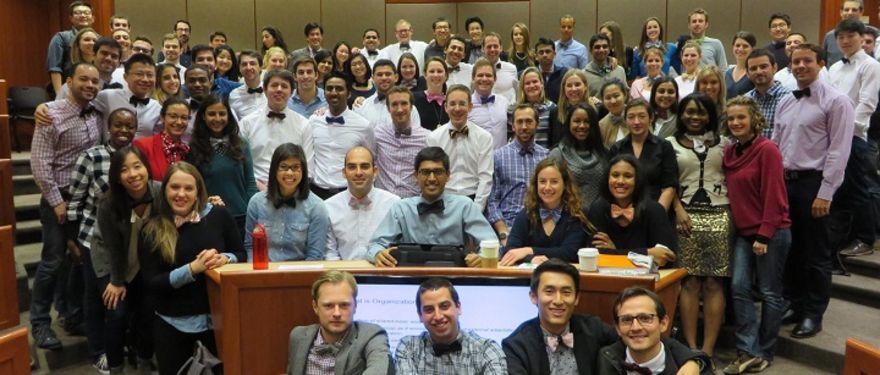Before I came to HBS, I bootstrapped a software company, Proximate, for three years.* We make social-media marketing software for alumni and trade associations.
In many ways, HBS made starting my own business possible. I was a 2+2 admit, which meant I always had the "safety net" of coming back to school if things didn't work out. As an aside, I encourage all 2+2ers do go try something crazy before you get here - why the heck not?
When my deferral period expired in the fall of 2014, I returned to campus. I thought I'd "round out" my skill set through a variety of non-entrepreneurial courses. Maybe I'd learn how to discount a cash flow (what was a cash flow, anyway?) or how to read a balance sheet.
I wasn't sure how much of "general management" would apply to what I'd done, or what I wanted to do in the future. As it turned out - plenty. I did, in fact, learn how to do a DCF, and how to read a balance sheet. Tuition well spent! Sometimes the cases we’d read to apply these concepts were about oil rigs or department stores—and sometimes they were about technology companies, too.
All the case studies we read took a form startups know well. Smart people struggling with uncertainty, having to make crisp decisions. After a month or so, I started pattern-matching. I was seeing reasons, and sometimes solutions, for the problems that had so confused me at my startup.
Prof. Tom Eisenmann, who pioneered product management courses here, defines entrepreneurship as "pursuit of opportunity beyond resources controlled." One of the scary things about entrepreneurship is that you'll never feel that you have all the resources you need - money, talent, training - to pull it off.** The opportunities and challenges are just too big for that.
There's no way to know for sure that you'll be successful. But what you learn here at HBS can sure increase your odds. Here are some of the experiences I've had that will make me a better founder after school.
The RC Year
The Required Curriculum, RC, is exactly what it sounds like. Required. Nobody asked me what courses I wanted to take my first year. Actually, I kind of liked it that way. It's an opinionated, "liberal arts" view of a classically trained manager's toolkit.
There are implications for founders all through the RC. The FIELD course has design thinking at the core. It's a hands-on way to practice customer discovery and rapid iteration. The Entrepreneurial Manager class applies founder concepts like lifetime value, customer acquisition, and staged financing. And every course included early-stage company cases.
Ironically, understanding how businesses work outside of startups has been the most helpful of all. Learning how businesses do finance, accounting, operations, and marketing (when they're sure of who their customer is) has been incredibly informative.
Sometimes you'll see those techniques break down when applied to entrepreneurial companies. You can't do a discounted cash flow on a pre-revenue startup, but that doesn't mean it's worthless. In other cases, an entrepreneurial business model works even better with those techniques. Amazon is taking over the world with great working capital management. Either way, you'll understand why startups that succeed, do so.
My sectionmate and friend Ellen Chisa wrote a fantastic piece on implications of the RC courses for people in our industry. You should read it.
The EC Year
In the Elective Curriculum, you can specialize in the challenges you'll likely encounter after school. I've taken courses with titles like: Entrepreneurial Finance, Venture Capital and Private Equity, Launching Technology Ventures, and Entrepreneurial Sales and Management. You'll also find courses on big data, digital marketing, and product management. There are more courses about entrepreneurship than one person can take.
The best part is that, through the RC, you'll have learned HBS's method of inquiry: strong opinions, loosely held. Through the cases I’ve read I have new mental models and find myself breaking down problems in a way that wasn't possible when I started at HBS.
Outside of Class
I've focused on classes so far in this post. That's where you'll soak up the big ideas that will help you start successful companies. But, like everyone says, an MBA from Harvard is more than your time in class.
The entrepreneurial community here is so generous with their time and experiences. I've had friends spend hours on a Saturday “whiteboarding” concepts with me. Professors will critique business plans, and many are angel investors themselves. The Rock Center and the iLab have staff and mentors to hone your pitch and help you find funding.
There are also clubs and groups that will allow you to practice skills outside of class. The Tech Club, Business Analytics & Data Club, and Code Club provide dozens of courses in software development and data science. As with everything else on campus, finding things you'll want to learn isn't hard. The trick is fitting it all into two years.
Starting a company can be lonely. It's hard. It's uncertain. You're most likely going to fail. It's easy to think you're not smart enough or tough enough. It helps to have peers who love building companies as much as you do, ready to ride that roller coaster with you. Maybe you've been starting companies for a decade. Maybe you're unsure and just want to try entrepreneurship out at HBS. Either way, you'll find the support you need here.
Get building.
* You'll notice that URL is still live. Proximate is still in business, and growing. The great thing about software is that it keeps running even if the CEO is in class five days a week.
** Another scary thing about "entrepreneurship" is that even after five years of doing it, and two years studying it, I can't reliably spell it.

